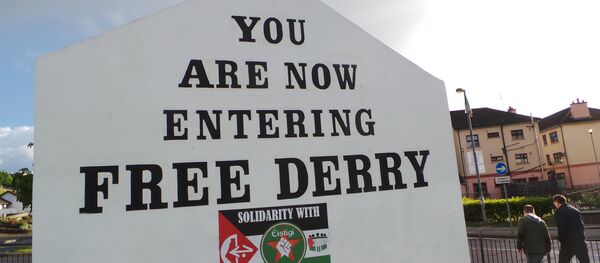The IRA was a terrorist group who targeted British soldiers in Germany and elsewhere throughout the 1980s and 1990s as they sought to force London to withdraw forces from Ulster and agree to a united Ireland, despite the opposition of the unionist or loyalist majority.
In 1994, the IRA agreed a ceasefire as talks began with the then Conservative government, but the talks broke down in February 1996 and the Provos, as they were known, exploded an enormous bomb in the heart of London's Docklands.
Four months later an "active service unit" of the IRA tried to attack the British Army's Quebec Barracks in Osnabruck.
They tried to fire three mortar shells from a makeshift battery on the back of a Ford Transit van, but two failed to explode and the third landed on the forecourt of a gas station on the base, leaving a large crater but not injuring anyone.
The following year Tony Blair's new Labour government persuaded the IRA to return to the negotiating tables in April 1998 the Good Friday Agreement was finally signed, bringing to an end "the Troubles."
Most of the terrorist crimes committed during the Troubles were included in an amnesty, which was part of the Good Friday Agreement, and hundreds of convicted IRA and loyalist terrorists were released from prison in England, Northern Ireland and the Republic of Ireland.
But Germany was not a signatory to the agreement and the 48-year-old man, who cannot be identified because of Germany's strict privacy laws, was arrested in December at Frankfurt airport after being extradited by the Irish authorities.
He will go on trial on July 26, accused of attempted murder.
In 2002 another man, Michael Dickson, was arrested in Prague, and the following year he was jailed in Celle, Germany, for six and a half years for his role in the Osnabruck attack.
Backlash over Army pension for IRA bomber Michael Dickson: There has been an angry reaction to a report that a… https://t.co/3KZF48kFkC
— Belfast Journal (@belfastjournal) March 7, 2016
His trial heard the attackers' set fire to the van after the attack, but failed to destroy the number plate, which was traced back to Yorkshire.
Dickson, a former British Army soldier himself, spent 27 months in jail. In 2016, it emerged he was receiving a British Army pension despite having tried to kill his erstwhile comrades in arms.
In 2007, a court in Northern Ireland refused to extradite a 35-year-old woman, Roisin McAliskey, to Germany for her alleged involvement in the attack. She was the daughter of notorious Irish republican MP Bernadette Devlin.



